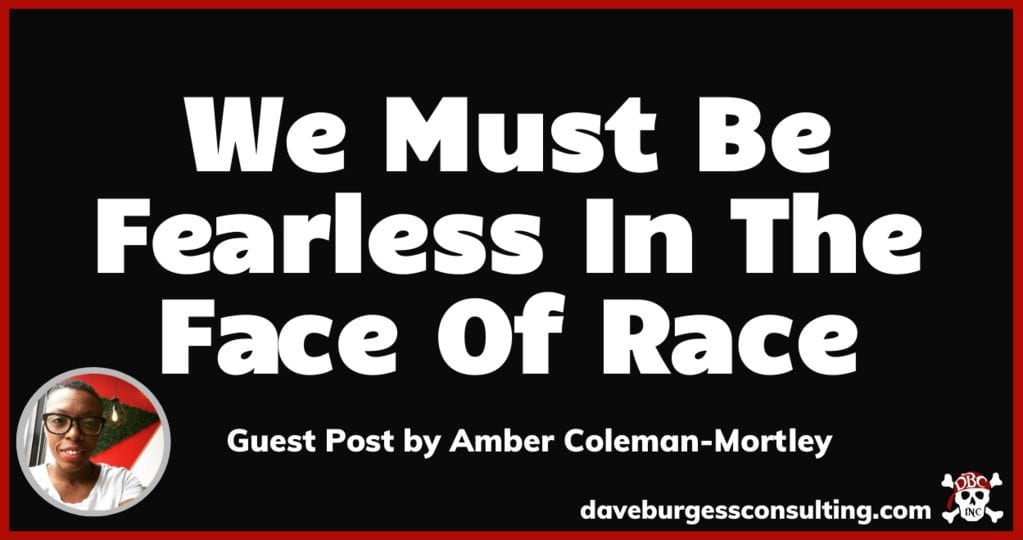This week we are honored to feature a guest blog, We Must Be Fearless in the Face of Race, written by Amber Coleman-Mortley. Amber is a former three sport all-conference athlete, a teacher and coach for a decade, an NBC Parent Toolkit Expert, and currently the Director of Social Engagement at iCivics, Inc. She also, with her three amazing daughters, created the #LetsK12Better podcast and blogs at https://www.momofallcapes.com/. In addition, we are proud to announce that she is a DBC Inc. author with a book on the way about having courageous discussions about race. The release date is not yet determined, but we could not be more excited to add this project to our line. Stay tuned for updates!
Please enjoy Amber’s post below.
We Must Be Fearless In The Face Of Race
Amber Coleman-Mortley (@MomOfAllCapes)
“We are very cruelly trapped between what we would like to be and what we actually are. And we cannot possibly become what we would like to be until we are willing to ask ourselves just why the lives we lead on this continent are mainly so empty, so tame, and so ugly.”
James Baldwin
Why are we so afraid to talk about race in America? What is holding us back from turning the whispers about race into sweeping action to change the way in which our country manifests equity and justice across peoples and cultures? We can no longer afford to look away, hide our heads in the sand, or run to the comforts of our guilty pleasures. To do so is an insult to our commitment to liberty and justice for all.
If we are to move forward, we must fearlessly face racism and create collective actions that free us from its grip. Facing racism isn’t about discouraging individuals from “being mean” to people who are different. Fighting racism requires critical thinking about the ways our schools, our economy, our political participation, and our health care outcomes are statistically inequitable across racial groups. Deconstructing racism requires us to analyze the historic and present ways that America has benefited from the free, cheap, and “essential” labor of black and non-black people of color. Awakening from racism means distributing a K-12 curriculum which trusts that our children possess the capacity to analyze history - glorious, ugly, and complete.
Talking about race will be intimidating and uncomfortable, but the weaponizing of the police by Amy Cooper against Christian Cooper in Central Park and the murders of George Floyd, Ahmaud Arbey, Breonna Taylor, and Tony McDade at the hands of police departments across the country, serve to remind us that we must address the crisis at hand. Our discomfort can no longer stagnate progress. Having meaningful discussions about race requires us to overcome the fear, guilt, or discomfort that creates a barrier to learning from and alongside others. It requires our openness to unlearning and challenging the biases that prevent us from seeing the humanity in other people. Standing on the side of justice requires us to take action. We must first take a stand.
Not being racist isn’t enough. Antiracism must become a social-emotional pillar in our homes, our schools, and in our neighborhoods. We can’t just dislike racism. We must take our flashlight of truth and point it to where racism hides in the shadows of our society, our institutions, and even within ourselves. We must embrace that long hard look in the mirror as a country. As individuals, we must reject the idea that adopting a culturally responsive curriculum for classes filled with students who are already culturally proficient in the ways in which our broken system impacts their lives, is enough. We must engage ourselves beyond tweets and hashtags in support and solidarity. We must entreat ourselves to:
Empathy.
How do we train ourselves, our students, and our own kids to think critically about injustice and apply that learning toward global outcomes? If we use empathy to center our discussions about differences and diversity we open ourselves to the possibility of having productive engagement with others. When we create welcoming spaces for our students, neighbors, and coworkers of different races, we are doing the necessary work to bridge divides that keep us from having meaningful human relationships.
Curiosity.
Read a book. Period. Read. Read lots of books on the ways in which race impacts and influences social life and policy and prepare yourself for the disappointment involved in learning about what’s really going on. Read books by black and non-black authors, so that you hear about life from their own perspective, understanding that the story of one does not speak for the many.
Bravery.
Understand that the variedness of your own identity may afford you the ability to turn off media and bad news when it gets to be “too much”. Some of your neighbors, friends, coworkers, and even family members do not have such a luxury. Commit to a lifelong journey and understand that it might require a strength you never knew you had.
The current civil unrest is the accumulation of decades and centuries of unrest. But this time, there are more people marching together toward justice, in the streets, on their smartphones, in their classrooms, and in their homes. More people are rolling up their sleeves and asking how they can do more. More people are willing to have conversations. There’s no guarantee that what we do today will solve our problems. In fact, the conversations we have today are not enough. We have a long road ahead. We have a lot more tears to shed. We have many more books to read and votes and years waiting for us to do the work. In the words of James Baldwin, “Not everything that is faced can be changed. But nothing can be changed until it is faced”.
Thank you, Amber.
Thank you so much, Amber, for sharing your voice. We are honored to partner with you.
More About Amber:
Amber Coleman-Mortley is the Director of Social Engagement at a national nonprofit for civic education. She holds a B.A. in African American Studies from Oberlin College and a Master of Communications from American University in Media Entrepreneurship. Amber is an NBC Parent Toolkit Expert. Subscribe to her podcast: LetsK12Better. Connect with her on Twitter: @MomOfAllCapes.
- Shelley & Dave

